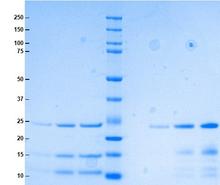
Chymotrypsin
Product Sizes
0.05 mg
16-19-030820-0.05MG
0.1 mg
16-19-030820-0.1MG
1 mg
16-19-030820-1MG
About this Product
- SKU:
- 16-19-030820
- Additional Names:
- Cystic Fibrosis, Pancreatic Cancer, Pancreatic Damage, In Vitro Diagnostic, SARS-CoV-2
- Buffer:
- Salt-free lyophilized solid
- CAS Number:
- 9004-07-3
- CE/IVD:
- RUO
- Extra Details:
- Chymotrypsin is a serine protease synthesized in the pancreas as the inactive zymogen chymotrypsinogen. Upon secretion into the duodenum, trypsin cleaves chymotrypsinogen to activate it, enabling its role in digesting dietary proteins by hydrolyzing peptide bonds adjacent to aromatic (tryptophan, tyrosine, phenylalanine) and hydrophobic residues. Its catalytic mechanism relies on a triad of serine, histidine, and aspartate residues, with substrate specificity dictated by a hydrophobic binding pocket. Pancreatic duct obstruction in Cystic Fibrosis leads to elevated serum levels of chymotrypsinogen due to impaired secretion, while fecal chymotrypsin decreases, reflecting exocrine insufficiency. This dichotomy aids diagnosis, as low fecal levels (<120 ug/g) correlate with fat malabsorption and pancreatic dysfunction. Reduced chymotrypsin activity in stool serves as a biomarker for progressive pancreatic damage and insufficiency. Genetic mutations in CTRC, encoding chymotrypsin C, heighten chronic pancreatitis risk by disrupting trypsin regulation. In pancreatic cancer, elevated serum chymotrypsinogen levels may indicate ductal obstruction or tumor-related inflammation. Chymotrypsin quantification in stool remains a non-invasive diagnostic tool for pancreatic insufficiency, particularly in CF and chronic pancreatitis. Clinically, chymotrypsin supplements are used in enzyme replacement therapy to mitigate malabsorption in pancreatic disorders. Experimental therapies targeting chymotrypsin's regulatory role in trypsin activation show promise for pancreatitis management. Additionally, its proteolytic properties are leveraged in wound debridement and cataract surgery, though evidence for efficacy in other conditions (e.g., burns, ulcers) remains limited.
- Formulation:
- Salt-free lyophilized solid
- Molecular Weight:
- 25,000 Da
- Physical State:
- Lyophilized
- Purity:
- ≥95%
- Purification:
- Liquid Chromatography Methods
- Shipping Conditions:
- Blue Ice
- Source:
- Prepared from pancreas shown to be non reactive for HBsAg, anti-HCV, anti-HBc, and negative for anti-HIV 1 & 2 by FDA-required tests.
- Storage Conditions:
- Please refer to datasheet
- Supplier:
- Athens Bioscience, Inc.
- Type:
- Proteins, Peptides, Small Molecules & Other Biomolecules: Enzymes


